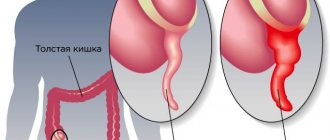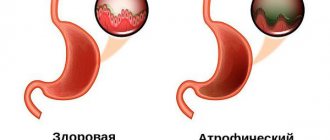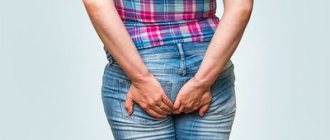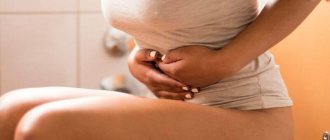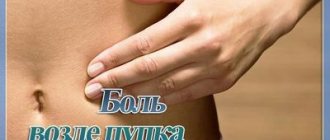Pain that occurs in the lower abdomen after sexual intercourse should immediately alert you. It cannot be ignored, as it may indicate some organ pathologies. Trying to drown it out with painkillers is not recommended; it would be much wiser to visit a doctor and get examined. Based on the results obtained, it is possible to identify the cause that caused the pain and, accordingly, eliminate it. This will prevent the development of complications and restore harmony in your intimate life. Many causes of pain in the lower abdomen after sex can be successfully treated, so there is no point in tolerating it.
Cystitis and sex
If you had prolonged or too intense sexual contact, then after it you may experience a frequent urge to urinate and pain during it; these symptoms do not always indicate an infection. They often arise due to the fact that the bladder, and in particular the neck and urethra, become “irritated” due to mechanical stress.
If these symptoms do not subside within 24 hours, then you should collect a urine test, an average sample, and contact a specialized doctor for cystitis (urogynecologist, gynecologist, urologist) as a matter of urgency.
A woman’s stomach hurts very badly after sexual intercourse: causes
If cramps are observed regularly and become a cause of concern, you should consult a doctor. Suffering after coitus indicates serious illness.
A woman's stomach hurts very badly after sexual intercourse, reasons:
- Uterine fibroids and endometriosis. It is with these ailments that during penetration, pain in the womb area can be observed, not on the side, but in the center.
- These pathologies are quite dangerous and can be completely asymptomatic. That is, suffering during penetration may be the only signs of illness.
- If the pain is located on the side, in the area where the appendages are located, this may indicate pathology.
Cystitis at any age
An acute attack of cystitis after sexual intercourse can occur at any age. Decades ago, when women maintained their virginity until marriage, cystitis that occurred after sexual intercourse was called the “honeymoon disease.”
At the present time, the fact is that no matter what your age, if the contact took place after a long break, the meeting was too active or sex happened with a new partner, you are not immune from the development of acute cystitis.
Causes of cystitis after sex
The main cause of inflammation of the bladder after sexual intercourse is a bacterial infection - the entry of pathogenic microorganisms into the female bladder.
Inflammation of the urinary tract after sexual intercourse can occur for several reasons, mainly anomalies of physiological development. In some women, the external opening of the urethra is located close to the opening of the vagina and bacteria easily enter the bladder.
Another cause of cystitis may be poor personal hygiene, both by women and men. Dirt and bacteria from the hands or genitals can enter the urinary system and cause inflammation.
In addition, the cause of the disease may be a combination of anal and vaginal sex in one sexual act. Among the bacteria that cause cystitis is E. coli, which, when it enters the urinary system, causes extremely unpleasant consequences. Up to 90% of cystitis is caused by the bacterium Escherichia coli, and movement during sex helps move this bacterium into the urethra and bladder.
Cystitis after sex can also develop due to sexually transmitted diseases, microflora disturbances in the vagina, and as a result, with inflammatory phenomena in the pelvic organs.
Any damage to the mucous membrane of the urethra during sexual activity gives rise to excessive proliferation of pathogenic microflora and the development of inflammatory processes. This is especially true if a woman has not had sex for a long time, sexual intercourse was prolonged and/or the woman’s vagina is poorly moisturized (dry, due to the lack of a sufficient amount of “natural” mucus).
Some women also find that certain sexual positions cause irritation and cystitis. Sex from behind, for example, is especially harmful for women who are prone to cystitis.
A woman's back hurts after sexual intercourse, causes
Crashes after coitus can be located not in the womb area at all, but in the lumbar area and back. This indicates that the ligamentous apparatus is affected.
A woman's back hurts after sexual intercourse, reasons:
- This occurs due to spasm, or due to endometritis, endometriosis, malignant and benign pelvic tumors.
- With endometriosis, tissue can grow outside the uterus. It often affects areas near the spine and ligaments. That's why my lower back hurts.
- Due to the presence of tumors, the uterus can enlarge, grow, and as a result of penetration, pressure is exerted, which provokes suffering.
- Therefore, aching sensations and heaviness in the lower back after coitus most likely indicate the presence of endometriosis and neoplasms in the area of the uterine body.
After coitus
The first signs of cystitis after sex
Cystitis after sex has several differences from acute cystitis. First of all, symptoms of the disease occur either in the first few hours or 1-2 days after intimacy.
The first symptoms are a frequent urge to urinate, which is accompanied by pain, burning, stinging, a feeling of incomplete emptying of the bladder, urine changes color and smell, and becomes cloudy. Body temperature may rise to subfebrile levels, pain or discomfort may appear in the lower abdomen and lumbar region. Some symptoms may be less severe or not appear at all.
Make an appointment
Make an appointment with a gynecologist by calling 8(812)952-99-95 or filling out the online form - the administrator will contact you to confirm your appointment
guarantees complete confidentiality
Why do women experience nagging pain in the lower abdomen after sexual intercourse?
If pain in the pelvic area appears a few days after making love, then we are talking about ailments that are spread during coitus. It is after 2-10 days that most ailments that are transmitted as a result of the exchange of biological fluids appear.
Along with abdominal pain, the following symptoms may occur:
- Discharge not typical for a woman. They can be green, yellow, watery, gray with an unpleasant odor. You can find out more about allocations here.
- Itching during urination. Even the most commonplace thrush that appears after coitus can be accompanied by pain during urination. Not only the vagina becomes infected, but also the urethra.
- Fever, general malaise. This happens extremely rarely if the illness is serious and is accompanied by an increase in the concentration of leukocytes in the blood.
- The mammary glands hurt, because STDs often provoke hormonal imbalance.
Mostly nagging pain in the lower abdomen in women after sexual intercourse is caused by ailments transmitted during penetration. They usually do not cause an increase in temperature; almost all symptoms are observed in the vaginal area. Manifested in the form of itching and vaginal discharge.
Unpleasant sensations
Complications and consequences of postcoital cystitis
Cystitis after sex is dangerous due to its complications, like any other inflammation.
If you ignore the first signs, the disease may develop into a more severe form that is more difficult to treat. Infection from the bladder can spread higher and provoke inflammatory kidney disease - pyelonephritis. In addition, if cystitis after sex occurs every time, a woman will eventually lose the desire to have sexual intercourse due to the fear of getting cystitis again, and this in turn leads to uncertainty, stress, disagreements between partners, etc.
Recently, self-medication has become widespread, and women who already know their problem can take a course of antibiotics immediately after sexual intercourse, but regular use of such drugs can cause other, more serious problems (in particular, uncontrolled use leads to drug resistance, i.e. e. antibiotics become powerless in the fight against pathogenic microorganisms).
In addition, antibiotic treatment is contraindicated during pregnancy, and cystitis in this situation can lead to miscarriage, premature birth, and cessation of fetal development. All experts agree that cystitis requires professional and complete treatment, otherwise not only physical problems are possible, but also psychological ones, both on the part of the woman and the family as a whole.
In response to inflammation, an admixture of blood may appear in the urine - hemorrhagic cystitis, and frequent episodes of inflammation lead to a chronic process with the involvement of deeper layers of the bladder wall in the inflammatory process, partial or complete destruction of the GAG layer (glycosaminoglycan layer) - a protective or barrier layer , which prevents the adhesion of bacteria to the bladder mucosa.
Why does a woman's right side hurt after intercourse?
These are not all the reasons why suffering occurs after penetration. It is worth carefully studying in which zone the pain appears. If after sexual intercourse a woman has pain on her right side , it is worth looking at the menstrual calendar and finding out when her period will be.
Aching sensations indicate ovulation and are not a pathology. Typically, such sensations appear 14 days after menstruation. Coitus coincided with ovulation. Don't be alarmed if you see blood on your panties immediately after coitus, or for some time. During ovulation, due to the rupture of the follicle, a small amount of blood may come out.
Tests for diagnosing cystitis
If a urogynecologist diagnoses “postcoital cystitis” (or cystitis after sex), to confirm it, not only anamnesis and examination of the patient is required, but also additional examination.
First of all, analyzes are carried out:
- general blood test (the basis for diagnosing most diseases),
- general urinalysis (study of the chemical and physical properties of urine, which may indicate pathological processes in the body),
- urine culture - bacteriological examination (detects infection in the urinary tract and its sensitivity to antibiotics),
- vaginal smear (allows you to identify pathogenic bacteria and identify the inflammatory process).
Instrumental diagnosis of cystitis
Instrumental diagnostics, as the name suggests, is carried out using instruments. Cystitis after sex can be confirmed in the following ways:
- Kidney ultrasound
- Ultrasound of the bladder
- Ultrasound of the pelvic organs
- Cystoscopy of the bladder in women
Ultrasound examination to detect signs of inflammation in the bladder and kidneys, uterus and its appendages.
Cystoscopy is an examination of the urinary tract using a special optical system to determine the volume and depth of damage to the bladder mucosa. (more details...)
Why do women's breasts hurt after intercourse?
Nowadays, many couples practice non-standard options for making love. Often during coitus, stimulation of the breasts can be observed. The nipple area is sensitive and can speed up the onset of orgasm.
Why do women's breasts hurt after intercourse?
- Some men get too carried away and massage their breasts very intensely. That is why after coitus there may be pain in the area of the mammary glands and nipples.
- If during penetration there was no pressure on the mammary glands, but the breasts still hurt, this indicates that menstruation is approaching. About 3-5 days before the expected menstruation, a large amount of progesterone is released into the blood, which provokes suffering.
- Therefore, if pain appears in the chest area after penetration, study the calendar and check whether menstruation may be coming soon.
Unpleasant sensations
Differential diagnosis of cystitis
Differential diagnosis consists of excluding diseases that are characterized by similar symptoms.
For example, if there are signs of cystitis (painful and frequent urination, changes in urine composition, etc.) and high fever, then this condition may be caused by inflammation of the renal pelvis, not the bladder, and the presence of blood or pus in the urine may be caused by the presence of stones in the urinary tract.
If cystitis after sex bothers you for a long time and is difficult to treat, you should undergo a full examination; perhaps the reasons lie in the presence of other diseases - for example, an active viral infection, sexually transmitted diseases, etc.
Signs of cystitis that are not confirmed by the presence of bacteria in the urine may be associated with a fairly common female disease - cystalgia. The disease occurs exclusively among the female population, characterized by frequent and painful urination and pain in the lower abdomen. Cystalgia has not been fully studied, but, according to some data, it is associated with hormonal disorders and circulatory disorders due to pathological processes in the pelvic organs.
When making a diagnosis, the urogynecologist relies on the patient’s complaints and the results of the examination.
Why does a woman’s lower abdomen hurt after unprotected intercourse?
Often after making love, pain can be observed in the vaginal area and labia.
Why does a woman’s lower abdomen hurt after unprotected intercourse?
- This is due to overstimulation and lack of lubrication. Therefore, if each time after coitus there is excessive dryness, burning and itching, as well as pain, we recommend using a lubricant.
- In addition, doctors recommend paying more time and attention to stimulation before penetration. We need to organize some foreplay. Men are so carried away by the process that they strive to quickly engage in penetration, forgetting about sufficient stimulation.
Pain
Treatment of cystitis after sex
Treatment is both symptomatic and etiotropic in nature (i.e., eliminating the cause of the disease).
For example, the presence of inflammation in the vagina is eliminated with the help of local antifungal and antibacterial drugs. If a sexually transmitted disease is detected, a specialist requires treatment of both partners. If there are anatomical features of the urinary system, the urogynecologist may recommend surgical treatment - urethral transfer, i.e. transposition of the urethra (higher above the vagina), if necessary, the surgeon excises the remains of the hymen, which “stretch” the urethra.
After surgery, recovery takes 7-15 days; in 85% of cases, the operation allows you to forget forever what cystitis after sex is.
Methods of treating pathologies
Cervical erosion
Some disorders, for example, features of the hymen, cannot be treated. Psycho-emotional blockages require the patient to work with a psychotherapist and psychologist. If pain persists for a long time and a certain disease is identified, complex therapy is prescribed:
- hormonal drugs;
- surgical intervention;
- medical manipulations such as cauterization of erosion;
- antibiotics for infections.
To correct pain during the treatment of the underlying disease, antispasmodics, analgesics and anti-inflammatory non-steroidal drugs are often prescribed.
Taking NSAIDs and other painkillers without consulting a doctor on an ongoing basis is prohibited. Medicines will quickly become addictive and stop working, and will also make it difficult to diagnose the disease.
A pulling sensation in the lower abdomen after unprotected intercourse is not pregnancy in most cases. Especially if they occur on the first or second day after coitus. For a full diagnosis and identification of the exact cause of the condition, a visit to a gynecologist, tests and ultrasound are required.
Medications
The main treatment for postcoital cystitis is primarily aimed at blocking the spread of infection. Antibacterial therapy helps with this.
The main treatment of cystitis is supplemented with medications that help reduce the unpleasant manifestations of the disease and normalize the functioning of the urinary system - painkillers, herbal medicines, immunostimulants, vitamin complexes.
In the treatment of inflammatory processes in the bladder, the administration of anti-inflammatory drugs through the urethra into the bladder (instillation) is often used.
Cystitis after sex with proper treatment and following all the doctor’s recommendations goes away within a week, but immunostimulating drugs, herbal medicines and vitamins should be taken longer (2-3 weeks).
With this disease, it is extremely important to complete the full course of therapy, otherwise cystitis will become chronic, and treatment of chronic pathology will be much more difficult.
What is pain like during sex?
pain that occurs during intimacy, dyspareunia . It can hurt in different ways. Often women describe this as an unpleasant sensation, a burning sensation, discomfort, stretching, tingling. Often the pain is accompanied by copious discharge of an unnatural color.
According to medical observations, more than half of all women experience dyspareunia at one time or another in their lives. This disease most often occurs among women in the postpartum period, as well as during menopause.
The cause of pain can be anything - in fact there are many of them. Depending on the source of pain, the causes are:
- Symptomatic, or physical . In this case, pain during sexual intercourse is a symptom of some disturbance in the functioning of the genitourinary system - these are cicatricial changes in organs, their traumatic injuries, inflammation, tumor processes, disruption of the integrity of the hymen (defloration).
- Psychological . In this case, dyspareunia is caused solely by the psychological state of the patient. These are conflicts in the couple, anxiety and obsessive states (for example, fear of pregnancy or the possibility of contracting sexually transmitted infections), traumatic situations in the past (for example, betrayal of a partner or sexual violence), feelings of guilt towards a partner, fear after a painful childbirth, loss loved ones and others.
- Mixed . In this type of dyspareunia, physiological causes first arise, to which psychological ones are then added. The woman begins to fear the pain will recur and refuses intimacy. A striking example is endometriosis . It leads to quite noticeable pain during sex with a partner. The next time the woman begins to fear the appearance of this pain, she cannot relax, the muscles of her intimate organs spasm (this phenomenon is called vaginismus), causing discomfort. Since there is no arousal, mucus is not produced, and an additional feeling of dryness and discomfort occurs. It's a vicious circle.
Depending on the location of the pain, dyspareunia occurs:
- Superficial – when it hurts “outside” . Somewhere where the labia majora and minora are, the clitoris, near the entrance to the vagina. Discomfort appears during foreplay or at the very beginning of sexual intercourse, when partners try to get closer. Often such superficial pain indicates fungal diseases, genital herpes, bartholinitis and genital defects.
- Deep - when the pain is localized somewhere inside, in the pelvic area. Unpleasant sensations arise directly during lovemaking. This type of pain often indicates inflammation of the female organs, the presence of infectious diseases, sexually transmitted diseases, and tumors.
Traditional treatment
Traditional medicine is used to remove inflammatory processes in the bladder, and this is only possible after prior consultation with a specialist. One of the most common methods in folk medicine is to use a heating pad or hot bottle. Yes, there really is relief, but! only for a while, because the cause has not been eliminated, and the bacteria in the bladder has not disappeared.
It is worth remembering that cystitis after sex requires an integrated approach and should include the use of antibiotics, antispasmodics, uroseptics and other medications.
It is important to follow a home regime, diet and drink plenty of fluids. So cold, the use of cold drinks, caffeine, and spicy foods aggravate the symptoms of the disease.
Why does the lower abdomen hurt after intimacy in women: reviews
Below you can read reviews of girls who experienced cramps a few days after coitus.
Why does the lower abdomen hurt after intimacy in women, reviews:
Marina, 38 years old. I regularly experienced nagging pain after making love. I have had a constant partner for 15 years, so no changes have been observed. The pain recurred over and over again, so I made an appointment with the doctor. It turned out that I have erosion. After curing it, the pain during and after lovemaking went away.
Olga, 30 years old. I recently divorced my husband, so I am now looking for a new partner to live with. Now I have another man whose penis size is much larger than that of my ex-husband. Therefore, immediately and several days after coitus, cramps and pain were observed. Now we use a lot of lubricant and spend more time caressing before penetration. The situation has improved significantly. We also changed positions so that there was no very deep penetration.
Veronica, 29 years old. I'm married and have two children. My husband has been alone for 7 years. After penetration, nagging pain appears. I was forced to see a doctor. I was diagnosed with endometriosis. Unfortunately, after installing the Mirena coil, which the doctor recommended to me, the pain did not disappear. Therefore, now I try in every possible way to avoid making love, because they are very painful for me.
Everything hurts.
A lot of interesting information about women’s health can be found in the articles below:
Should there be discharge before menstruation and what types are there?
Bloody discharge after childbirth. How long does the discharge last after childbirth?
What does discharge during pregnancy in the early and late stages indicate?
When infected with infectious diseases, you should not expect that there will be any manifestations immediately after penetration. Typically, pain in the lower abdomen appears a few days after contact.
Surgical treatment of cystitis
Cystitis after sex is treated mainly with therapeutic agents; surgical treatment may be required to change physiological developmental abnormalities, for example, when the urethra is located close to the vagina, which leads to trauma to the canal and the rapid spread of infection into the bladder. During the operation, the surgeon moves the opening of the urethra to the desired location. After surgical treatment there are almost no complications and the problem of cystitis after sexual intercourse for women in 85% of cases remains a thing of the past.
Why does the lower abdomen hurt in women after sexual intercourse?
In some cases, this does not indicate significant pathologies. Usually, unpleasant sensations are caused by new positions that provide deep and rough penetration of the partner, or non-standard types of sexual contact. Many women have a question: why does the lower abdomen hurt in women after sexual intercourse ? If the penetration was quite rough, then you should not be surprised when pain appears. There is minor trauma, which goes away very quickly. After all, there is strong pressure on the pelvic floor, and muscle fibers can stretch. There are several reasons why pain in the pubic area is observed after penetration.
Pain
Prevention
- As a preventative measure, both partners should be sure to maintain good hygiene.
- Partners should avoid sexual positions that create pressure or friction on the urethra, as well as intense tempos.
- It is necessary to use special lubricants (lubricants) in case of natural deficiency of vaginal mucus.
- Provide timely treatment for gynecological diseases.
- Do not use spermicides or vaginal diaphragms for contraception.
- It is recommended to empty the bladder immediately after sexual intercourse, this allows you to “evacuate” most of the bacteria that have entered the bladder.
- Immediately after contact, drink at least 300 ml of liquid.




